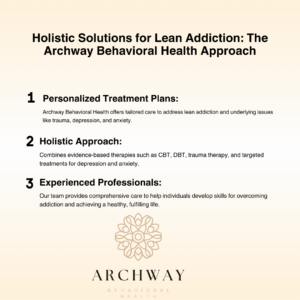Lean, also known as purple drank or syrup, is a concoction made from prescription-strength cough syrup mixed with soft drinks and, often, candy. The main ingredients—codeine and promethazine—can create a relaxed, euphoric state, which is why it has become popular among some people, especially in certain music cultures. However, the misuse of lean carries significant health risks, including mental health, and overcoming this mental health can be challenging. This blog will explore the challenges of lean mental health treatment programs and how effective therapies like CBT, DBT, trauma therapy, depression therapy, and anxiety therapy can help in overcoming this struggle.
The Challenges of Lean Mental Health
Lean mental health is particularly challenging to overcome because it often develops quickly, and the withdrawal symptoms can be severe. When a person tries to stop using lean, they might experience intense cravings, anxiety, depression, insomnia, and physical pain. These withdrawal symptoms can make it extremely difficult for individuals to quit on their own.
Additionally, lean is often glamorized in popular culture, making it harder for users to recognize the severity of their mental health. The social and psychological aspects of lean mental health are deeply intertwined, making a holistic approach to treatment necessary.
Cognitive Behavioral Therapy (CBT) for Lean Mental Health
CBT focuses on identifying and changing negative thought patterns that contribute to substance use. For someone addicted to lean, CBT therapy can help them understand the triggers that lead to their use, such as stress or social pressures. By learning to recognize these triggers, individuals can develop healthier coping mechanisms.
CBT also works to build problem-solving skills and increase self-control, which are crucial in resisting the urge to use lean. It involves setting goals, monitoring progress, and adjusting strategies as needed, making it a dynamic and adaptive form of therapy.
Dialectical Behavior Therapy (DBT) for Lean Mental Health
DBT therapy combines individual therapy with group sessions where individuals learn skills such as mindfulness, distress tolerance, emotional regulation, and interpersonal effectiveness.
Trauma Therapy in Lean Mental Health Recovery
Many individuals who struggle with mental health, including lean mental health, have a history of trauma. Trauma therapy is a critical component of mental health treatment because it addresses the underlying issues that may be driving substance use. Lean may be used as a way to numb the pain of past trauma, but this only exacerbates the problem in the long run.
Trauma therapy helps individuals process their traumatic experiences in a safe and supportive environment. Techniques such as Eye Movement Desensitization and Reprocessing (EMDR) or trauma-focused CBT can be used to help individuals reframe their trauma and reduce its power over their lives. By addressing trauma, individuals can reduce their reliance on substances like lean and build a foundation for long-term recovery.
Depression and Anxiety Therapy for Lean Mental Health
Depression therapy and anxiety therapy are essential components of a comprehensive mental health treatment plan for lean mental health. These therapies focus on helping individuals manage their symptoms through a combination of medication, lifestyle changes, and therapeutic techniques. For example, CBT is often used to treat both depression and anxiety by helping individuals challenge negative thought patterns and develop healthier ways of thinking.
In treating lean mental health, addressing the underlying depression and anxiety can reduce the desire to use substances and help individuals maintain their recovery.
The Role of Archway Behavioral Health in Lean Mental Health Treatment
At Archway Behavioral Health, we understand the complexities of lean mental health and offer a range of evidence-based therapies to support individuals in their recovery journey. Our team of experienced professionals provides personalized mental health treatment plans that address not only the mental health itself but also the underlying issues such as trauma, depression, and anxiety.
We believe in a holistic approach to mental health treatment, combining therapies like CBT, DBT, trauma therapy, depression therapy, and anxiety therapy to provide comprehensive care. Our goal is to help individuals build the skills they need to overcome lean addiction and lead fulfilling, healthy lives.
Conclusion
Overcoming lean mental health is challenging, but it is possible with the right support and treatment. By addressing the physical, emotional, and psychological aspects of mental health through therapies like CBT, DBT, trauma therapy, depression therapy, and anxiety therapy, individuals can achieve lasting recovery.
If you or someone you love is struggling with Lean mental health, don’t wait. Comprehensive treatment is available, and recovery is possible. Contact us at (888) 488-4103 to learn more about our specialized programs for trauma, depression, OCD, and more, and take the first step toward a healthier, more balanced future.
FAQs: Lean Mental Health Treatment
How can I help someone who is addicted to Lean?
If you are concerned about someone’s use of Lean, it is important to approach them with compassion and understanding. Encourage them to seek professional help and offer your support. You can also contact a mental health professional or mental health treatment center for guidance.
What are the challenges of treating Lean mental health?
Treating Lean mental health can be challenging due to:
- The addictive nature of codeine: Codeine is a highly addictive opioid, making it difficult to quit.
- Co-occurring mental health disorders: Individuals with Lean mental health may also have underlying mental health issues, which can complicate treatment.
- Stigma and discrimination: The stigma associated with mental health can make it difficult for individuals to seek help.
How long does it take to recover from Lean mental health?
Recovery from Lean mental health is a process that can take time. The length of recovery will vary depending on individual factors, but it is important to remember that it is possible to overcome mental health with the right support.
What are the long-term consequences of Lean mental health?
The long-term consequences of Lean mental health can include:
- Liver damage
- Kidney damage
- Heart problems
- Respiratory problems
- Cognitive impairment
- Social and relationship problems
- Legal problems
How can I prevent Lean mental health?
Educating yourself about the dangers of Lean and avoiding its use is essential for prevention. If you are concerned about someone’s use of Lean, encourage them to seek help and support.



